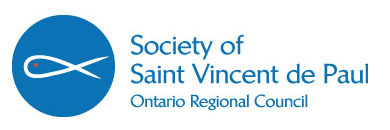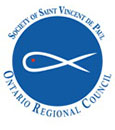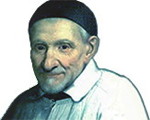





Moving Forward from the ashes in Fort McMurray(posted: October 19, 2016)Canadians were shocked to see the devastating images and the accompanying evacuation orders for the
residents of Fort McMurray in the first week of May. They responded as best they could with donations
and prayers. For many, those images may no longer be in the news forefront as other news events from
around the world take center stage. However, for the residents of Fort McMurray, they are challenged with
moving forward with their lives; for many, the road will be difficult and long.
The SSVP Western Regional President, Peter Ouellette, reached out seeking assistance to train volunteers in Fort McMurray to conduct needs assessments from families who were affected by the fires using the SSVP model of home visits. Fort McMurray has 2 Catholic parishes, but no SSVP conferences. I was humbled to be asked if I would assist. On August 19th, I redirected a return flight home and flew into Fort McMurray. I had mixed emotions ranging from some anxiety of what to expect and see, to excitement of sharing my SSVP home visitation experiences, with the hope that my time with the volunteers would meet or exceed their expectations. 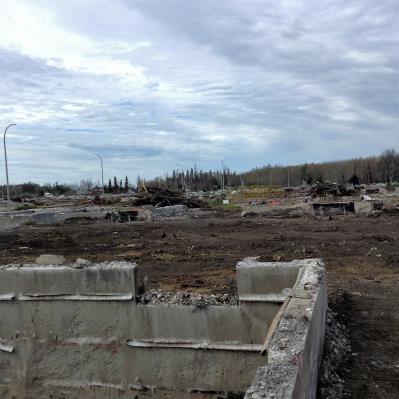 Upon the airlines descending approach to the Fort McMurray airport,
the first signs of the fire were evident. You could see large areas of
land burnt by fires. I was met by my first volunteer contact, Dan.
Dan was upbeat, positive and ready to start my journey meeting
many more volunteers. As we entered the city, I was surprised how
bustling it appeared. Dan had to make a side trip to the city
convention center where they were setting up for a one day Home
Show for several hundred businesses. It looked vibrant, not the
images that I envisioned for Fort McMurray. However that was soon
to change, as Dan took me to my first stop, to the community of
Abasand, the residential area where Dan lived and also lost his home
to the fire. The stark and harsh reality of the devastation was further
magnified by the fact that entry to any of the devastated communities
was strictly controlled, whereby only residents could enter and had
to register, signing an entry log with info on all accompanying
persons. As we ascended the hill, burnt trees and landscape led to a
vast wasteland of destruction. The images I have seen on TV were
void of the of the harsh reality of being there, traversing over the
charred foundations while listening to the stories Dan would reflect
upon of a once lively community with street BBQ's and many
friends, many of whom he does not know where they are today. We
toured several other areas, all scorched, a reminder of the intensity
of this fire. The cleanup effort (removal of debris, building
foundations and property lot restoration) where scheduled by the city
to be completed by the end of September before any rebuilding
permits were being issued. That deadline will not be met and it is
hard to comprehend if it could be completed within the next year.
Upon the airlines descending approach to the Fort McMurray airport,
the first signs of the fire were evident. You could see large areas of
land burnt by fires. I was met by my first volunteer contact, Dan.
Dan was upbeat, positive and ready to start my journey meeting
many more volunteers. As we entered the city, I was surprised how
bustling it appeared. Dan had to make a side trip to the city
convention center where they were setting up for a one day Home
Show for several hundred businesses. It looked vibrant, not the
images that I envisioned for Fort McMurray. However that was soon
to change, as Dan took me to my first stop, to the community of
Abasand, the residential area where Dan lived and also lost his home
to the fire. The stark and harsh reality of the devastation was further
magnified by the fact that entry to any of the devastated communities
was strictly controlled, whereby only residents could enter and had
to register, signing an entry log with info on all accompanying
persons. As we ascended the hill, burnt trees and landscape led to a
vast wasteland of destruction. The images I have seen on TV were
void of the of the harsh reality of being there, traversing over the
charred foundations while listening to the stories Dan would reflect
upon of a once lively community with street BBQ's and many
friends, many of whom he does not know where they are today. We
toured several other areas, all scorched, a reminder of the intensity
of this fire. The cleanup effort (removal of debris, building
foundations and property lot restoration) where scheduled by the city
to be completed by the end of September before any rebuilding
permits were being issued. That deadline will not be met and it is
hard to comprehend if it could be completed within the next year.I was introduced to my host family, Bernie and Bob. They were gracious to provide accommodations. Here I learned how the fires affected many others beyond the loss of their homes. Many homes incurred smoke damage as well as loss of fridge and freezer contents, mold in washing machines, resulting in the replacement of these appliances. As with Dan, the property loss could be replaced thru insurance, but many families were either underinsured or had no insurance. Additionally, everyone has a story to share about their ordeal at the time of the evacuation orders. 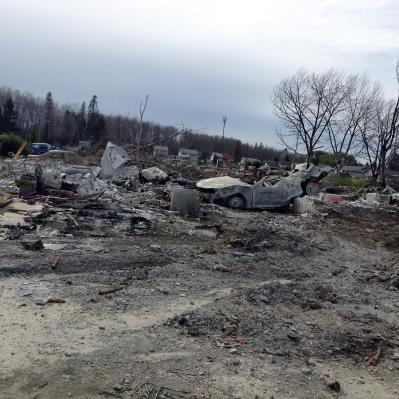 I had previously spoken with Matt, the Fire Committee coordinator, a demanding volunteer position necessary to coordinate uncharted activities. For a young family man, Matt remained composed, despite the long hours he contributed. He was unsure as to the number of people to expect Friday evening for the training session, possibly 10 as many residents still had not yet returned to Fort McMurray since their displacement, so when 26 volunteers arrived, all eager to help, I was ecstatic. My training program was to be divided into 3 sections: Day 1 - Using a modified version of the National Home Visit module, I provided instruction on the value and the 'how to' of the SSVP home visitation/assessment program. In addition I shared how being involved with SSVP has had a profound impact on my life ... it has changed my life very positively; it has strengthened my faith. Day 2 - Conduct home visits with selected Trainees. There were 8 home visits scheduled, so 4 Trainees were selected to conduct 2 visits each. The Trainee was positioned to take full control of the visit. At the conclusion of the visit, we would debrief. VERY detailed notes were recorded with required action plans and potential further follow-up actions beyond the initial assessment for both material and emotional support. Additionally I focused on the emotional feelings of the trainee as a result of the visit. We experienced several very WOW moments, where we saw incredible spiritual strength of families who have lost everything, who shared very personal tragedies and yet their faith was what kept them moving forward. 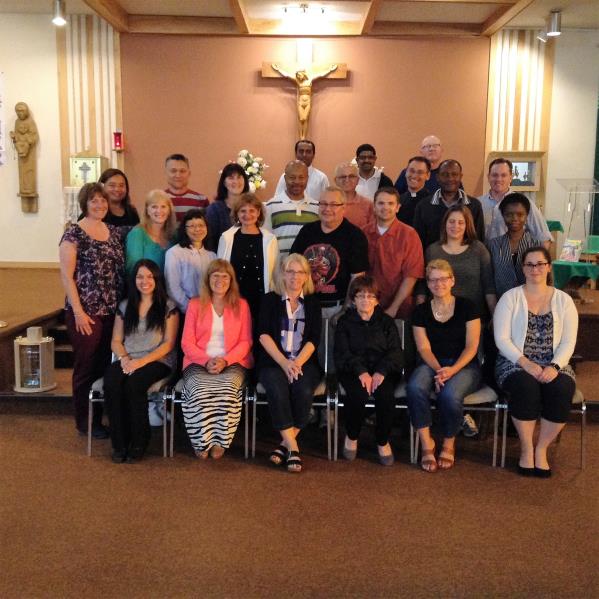
Day 3 - Conduct a 'Group Debrief' session with all Trainees. At this session, we invited all 26 attendees from the Day 1 session to return to participate in the discussions. I was excited that they all returned. We had one very important surprise bonus......an incredibly huge bonus! There was one new attendee, named Max. I asked him to introduce himself to the group. He said he was sorry he could not make the Friday meeting, but it was very important for him to attend this meeting as he heard it was being conducted on behalf of the SSVP. He shared a story of how SSVP was a very significant part of his life in Nigeria 20 years ago. His experience with SSVP changed his life forever ... many looked at me as these were the exact words I used in my presentation Friday evening. My body instantly had goose bumps. I felt Gods presence and support. Each of the 4 Trainees recapped their experiences. They also shared how they were personally touched by how families went far beyond telling about their experiences of their evacuations and loss of property, they also detailed very intimate other challenges in their lives that were emotionally moving. There was acknowledgement that the information shared by these families and the level of discussion and intimacy could never be attained outside of a home visit. The group was invited to ask questions from the trainees. The session was fruitful. The Trainees will now become the Trainers to continue on this process of orientation. An excellent foundation is firmly in place! We conducted a mini separate executive meeting to review the details of needs from the families visited. The goal was to approve immediate financial disbursement for families based on the information we received. I was very impressed by the trainees. They have demonstrated passion and commitment to stay connected with the families throughout their whole journey, no matter how many months it may take. Follow-up will go beyond monetary and material support, it will also include emotional support based upon the intimate stories shared by the families. I was so impressed by this additional level of support, that I will now include these additions to my presentations in Ontario. I would expect that focusing on only fire relief issues will last for 1-1/2 years, possibly longer. When this is complete, I would invite the parishes to identify how best to continue their community outreach activities for families in need, by possibly adopting the SSVP model of service. I am very grateful that I was given the opportunity to participate in this stage of their development. I was humbled and honored to meet many exceptional people. In many ways I am envious; I would love to be part of their development, as they journey together with families in need. Phil Bondy ONRC Regional VP Conference / Council Rejuvenation & Special Works News & EventsMoving Forward from the ashes in Fort McMurray
October 19, 2016 |
